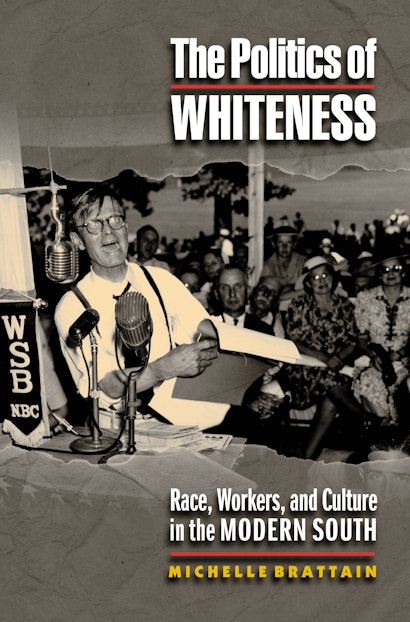The Politics of Whiteness presents the first sustained analysis of white racial identity among workers in what was the South’s largest industry—the textile industry—for much of the twentieth century. Grounding her work in a study of Rome, Georgia, and surrounding Floyd County from the Great Depression to the 1970s, Michelle Brattain paints a richly textured local portrait of how the varied social benefits of whiteness shaped the experience of textile millhands and, as a result, Southern politics. In doing so, she challenges traditional views of Southern politics as dominated by elites and marked by passivity among Southern workers. Brattain uncovers considerable white working-class political influence and activism for decades starting in the 1930s—which, by re-creating and defending Southern institutions grounded in the idea of racial difference, helped pave the way for resistance to the civil rights movement.
Structured chronologically, this book revises the current understanding, in the Southern working-class context, of paternalism, the New Deal, the 1934 General Textile Strike, the Second World War, and the Fair Employment Practices Commission. It addresses the vast influence of Eugene Talmadge and his son in twentieth-century Georgia politics, and the emergence of Republican influence in the South. Finally there came the moment when formerly explicit defenses of white supremacy were transformed into an intangible, but still powerful, politics of whiteness. The Politics of Whiteness will interest anyone concerned with the history of American politics, the labor movement, or race in America.
Michelle Brattain is Assistant Professor of History at Georgia State University.
"Brattain's book is well written and well researched. . .. By stressing the ambiguous nature of the relationship between race and class in the mid-twentieth-century mind, she has reminded us that political views are formed from a variety of impulses."—Tim Lockley, Political Studies
"Well written and soundly researched. . . . Brattain's monograph gives us a completely researched and cleanly written case study."—Hugh Davis Graham, Journal of American Ethnic History
"A compelling, thoroughly researched monograph with a serious argument worth engaging. It deserves the attention of students of twentieth-century southern, labor, and political history."—Steven A. Reich, Journal of American History
"A fine study that addresses major issues in southern and American history. It is well researched, well conceived, and generally persuasive."—Thomas E. Terrill, Journal of Southern History
"In a narrative that is briskly written, closely argued, and generally persuasive . . . Brattain argues that whiteness, far from being a troublesome distraction, was at the core of the white workers place in the South."—Carl Burkart, Southern Cultures
"Brattain's book is well written, and is a fascinating read on how local and state politics worked to protect local white privilege. . . . [O]ne suspects that the concept of whiteness and its influence on decisions made by American workers transcends the borders of a town in Georgia, and has much to say about how Americans share or do not share access to wealth and power throughout America today."—Mary Waalkes, Journal of Social History
"This study takes working class conservatism seriously and refuses to wave it away as false consciousness. It offers a full account of the role of whiteness and white privilege in structuring such conservatism, and intriguing hints as to the role of local boosterism and gender politics in generating both quietism and activism."—David Roediger, Babcock Professor of History, University of Illinois
"The Politics of Whiteness is a very fine piece of historical scholarship, written with verve, grace, and clarity. It is clearly a significant contribution to the history of race and of southern labor and politics. Through both its careful use of local history and its addition of racial analysis to the center of southern white labor history, this book will be of lasting influence on the future work of other scholars in this area."—Deborah Gray White, Rutgers University

